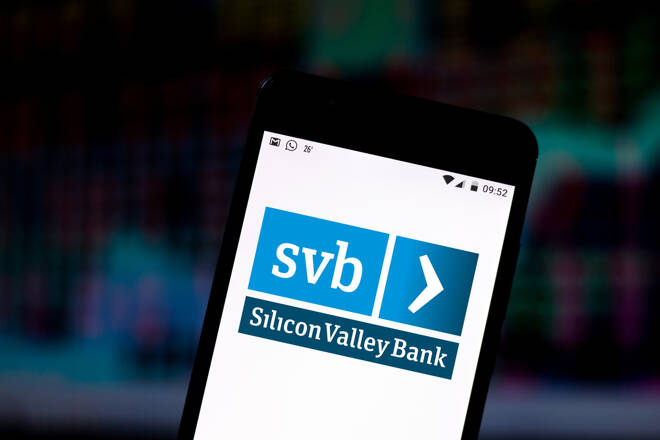Advertisement
Advertisement
SVB Financial to Acquire Boston Private in $900 Million Deal; Analysts Lift Target Price
By:
SVB Financial Group, the parent of Silicon Valley Bank, announced that it will acquire a financial holding company Boston Private in a deal worth nearly $900 million to accelerate its private bank and wealth management offering.
SVB Financial Group, the parent of Silicon Valley Bank, announced that it will acquire a financial holding company Boston Private in a deal worth nearly $900 million to accelerate its private bank and wealth management offering.
This acquisition gives SVB Financial another avenue to expand deeper into its tech-focused client base. According to the deal, Boston Private shareholders will receive 0.0228 shares of SVB common stock and $2.10 of cash and it is expected to close in the middle of 2021.
“Overall, we applaud the deal given the strategic rationale is compelling and the financial metrics are favourable albeit modestly so. Our lone concern is that management appears open to pursuing Boston Private (BPFH) lending verticals like C&I, CRE and multi-family, which are all outside SVB Financial’s (SIVB) core focus. Although a more comprehensive loan product offering would help SIVB drive down excess liquidity (45% loan/deposit ratio) and mitigate capital call concentration (53% of loans), it would represent a diversification into garden variety commercial bank products that run counter to SIVB’s core focus on innovation markets,” said Casey Haire, equity analyst at Jefferies.
“The BPFH loan portfolio is small (only 16% of pro forma loans) and thus not an immediate risk, but if management were to pursue aggressive diversification, it could potentially weigh on valuation metrics and/or expose the bank to higher credit loss.”
SVB Financial shares closed nearly flat at $387.34 on Monday. However, the stock rose over 50% in 2020.
SVB Financial Stock Price Forecast
Twelve analysts who offered stock ratings for SVB Financial in the last three months forecast the average price in 12 months at $377.00 with a high forecast of $440.00 and a low forecast of $300.00. The average price target represents a -2.67% decrease from the last price of $387.34. From those 12 equity analysts, six rated “Buy”, six rated “Hold” and none rated “Sell”, according to Tipranks.
Morgan Stanley gave a base target price of $385 with a high of $485 under a bull scenario and $212 under the worst-case scenario. The firm currently has an “Equal-weight” rating on the commercial bank’s stock.
Several other analysts have also recently commented on the stock. SVB Financial Group had its target price hoisted by analysts at Royal Bank of Canada to $437 from $320. The firm presently has an “outperform” rating on the bank’s stock. Barclays cut rating to an “equal weight” rating from an “overweight” and upped their price objective to $440 from $305. Wells Fargo upgraded to an “equal weight” from an “underweight” rating and upped their price target to $325 from $210.
Analyst Comments
“SVB Financial (SIVB) is one of the fastest-growing banks in our coverage universe, with an average of 20%+ loan and deposit growth annually since 2010, with the growth driven by its unique niche of lending to the technology and life sciences industries, including PE and VC capital call lines. While we expect growth to slow, we still see low-teens loan growth (well above peers) for the next several years,” noted Ken Zerbe, equity analyst at Morgan Stanley.
“We are Equal-weight the shares due to valuation. SIVB is trading at just over 20x forward earnings and more than 10 P/E points above its peers (versus a 4-6x multiple premium that we believe it deserves). SIVB’s earnings are highly sensitive to changes in Fed funds. Rate increases would drive higher EPS.”
Upside and Downside Risks
Risks to Upside: Higher interest rates. Stronger-than-expected loan growth. Credit costs remain at historically low levels. An increase in PE/VC investment, driving an increase in capital call line demand – highlighted by Morgan Stanley.
Risks to Downside: Significantly higher credit costs. Lower-than-expected interest rates. As significant slowdown in P/E, VC, and Tech investment, leads to slower loan growth.
About the Author
Vivek Kumarauthor
Vivek has over five years of experience in working for the financial market as a strategist and economist.
Advertisement
